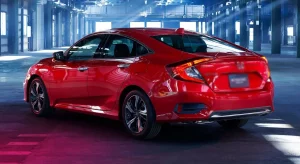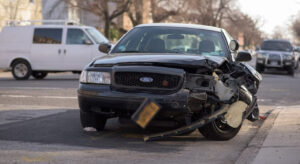Imagine you’re at a stop sign, and you turn to go through the intersection when another car crashes into your vehicle. You both get out of your vehicles and point fingers at one another. After all, no one wants to admit the accident was their fault.
But are you partially to blame? In many cases, both drivers may share fault for the accident. Here’s what to know if you are partly at fault in a car accident in Georgia.
Georgia Is Not a No-Fault State
As you may be aware, different states have different laws regarding fault. They can be no-fault or at-fault states. In a no-fault state, each involved party will need to file a claim with their own insurance, no matter who caused the crash. But in an at-fault state, the police will need to determine who is at fault. They may even assign fault to both parties in a crash.
Georgia is an at-fault state, which means that you can recover compensation if the other party is at fault. However, even if you share some of the blame, you can still receive compensation.
According to Norcross personal injury lawyer Pendergrass, problems may arise when your damages are greater than the coverage limit for the other party’s insurance. This is why it’s helpful to discuss the details of your car accident case with an attorney.
What Are Your Options?
If you are in an accident and the other driver has a greater percentage of fault, you may file a claim with your insurance. If the other driver was operating a commercial vehicle at the time of the crash, you could sue their employer. You could also file a lawsuit against the other driver.
Suggestion: Maxi Cosi Infant Car Seats To Buy In 2023
But when you share some of the fault in a car accident, having a car accident attorney represent you is in your best interest. The other driver may have been negligent, but if you were going a little over the speed limit or busy eating with just one hand on the wheel, they could help ensure you don’t take all the blame and lose any compensation you deserve.
Proving Negligence
In order for you to receive damages in your car accident case, you must prove that the other driver was negligent. To prove negligence, you need to show that the other driver owed you a duty of care and breached that duty. Furthermore, that breach resulted in your injuries, and you also suffered losses because of those injuries.
Keep in mind that the other driver will likely hire a lawyer to represent them. This lawyer will be looking for any shred of evidence that shows you caused the crash or that you were partially at fault.
What You Need to Know About the Comparative Negligence Rule in Georgia
Since both drivers are usually partly at fault in most car accidents, judges are tasked with determining which one has the higher percentage of fault. In Georgia, as long as you are determined to be less than 50% at fault in the crash, you can still file a lawsuit against the other driver.
However, the comparative negligence rule means that your damages will be reduced by the percentage of fault that you are assigned. Georgia law makes it difficult for drivers because if you have even a small amount of fault, your damages will be impacted. That can make a huge difference in the compensation you receive, which you’ll feel the full brunt of if you have massive hospital bills for your injuries.
Also Read: Is Idling Bad For Your Car?
Attorneys often want to work out a fair and just settlement rather than go to court. In the courtroom, the judge may find you had 51% of the fault, which would mean your case gets dismissed and you receive nothing for compensation. On the plus side, they may rule that you are only 5% at fault, assigning the other driver 95% of the liability, which would mean you’d get almost the full amount of your claim.
Comparative Negligence in Action
Since most car accidents involve blame for both drivers, it is important to consider this aspect as you file your claim. You’re much better off hiring a lawyer to keep you from getting assigned over 50% of the blame, which would leave you with nothing.
Let’s say you were at an intersection, and the other driver failed to yield, but you were speeding and on the phone at the time. The share of fault each of you is assigned will depend on the evidence of the crash, what witnesses observed, and whether either one of you was ticketed or arrested for the accident.
Perhaps the other driver was found to be 75% responsible for the crash, meaning you are 25% to blame. If your losses were $100,000 from the accident, then the comparative negligence rule would reduce it by 25%, or $25,000, meaning you would receive $75,000 in damages.
Why You Want a Car Accident Attorney After Being Partly At-Fault for a Crash
You may think the evidence against the other driver is much greater than the evidence against you in your car accident case. However, that other driver may already be working with an attorney.
Their attorney will immediately start looking for evidence to convince a judge that you were more at fault than they were for the crash. Car accidents often come down to finger-pointing, and in Georgia, if the balance of fault tips over 50%, you won’t get a penny for your damages.
This will mean that your debts will start piling up, and you’ll be trying to recover from your injuries and their financial impact. Car accident attorneys work on a contingency fee basis, meaning that you do not have to pay them upfront. At the very least, speaking with one about your case during a free initial consultation can help you gain valuable insight on how to proceed.






